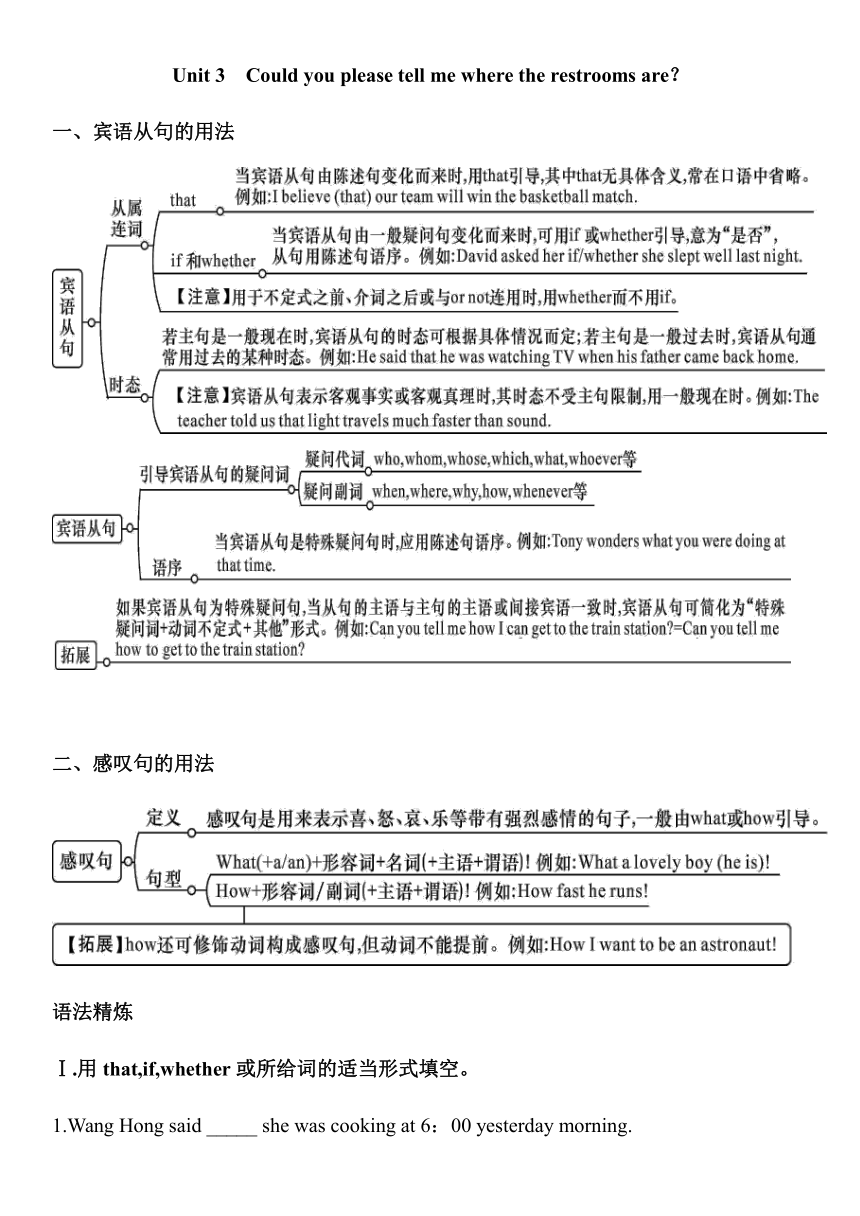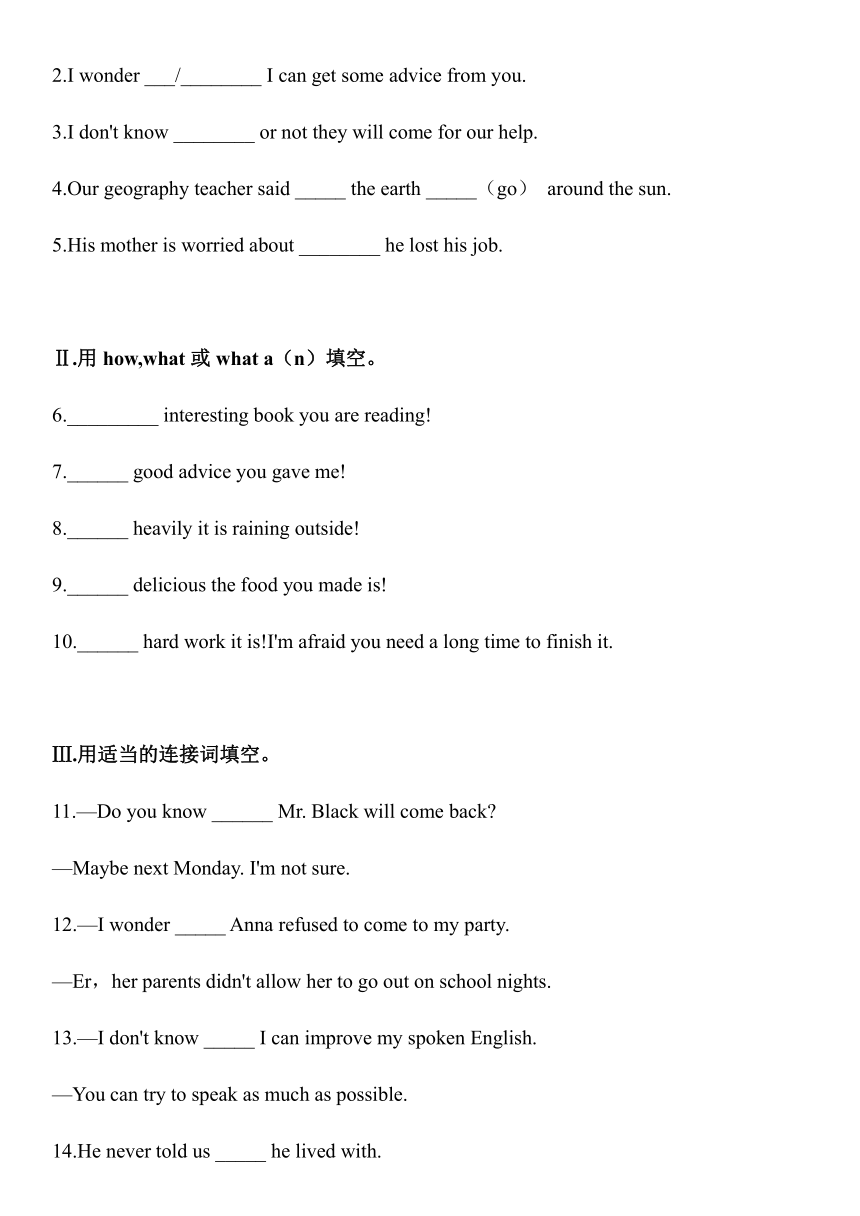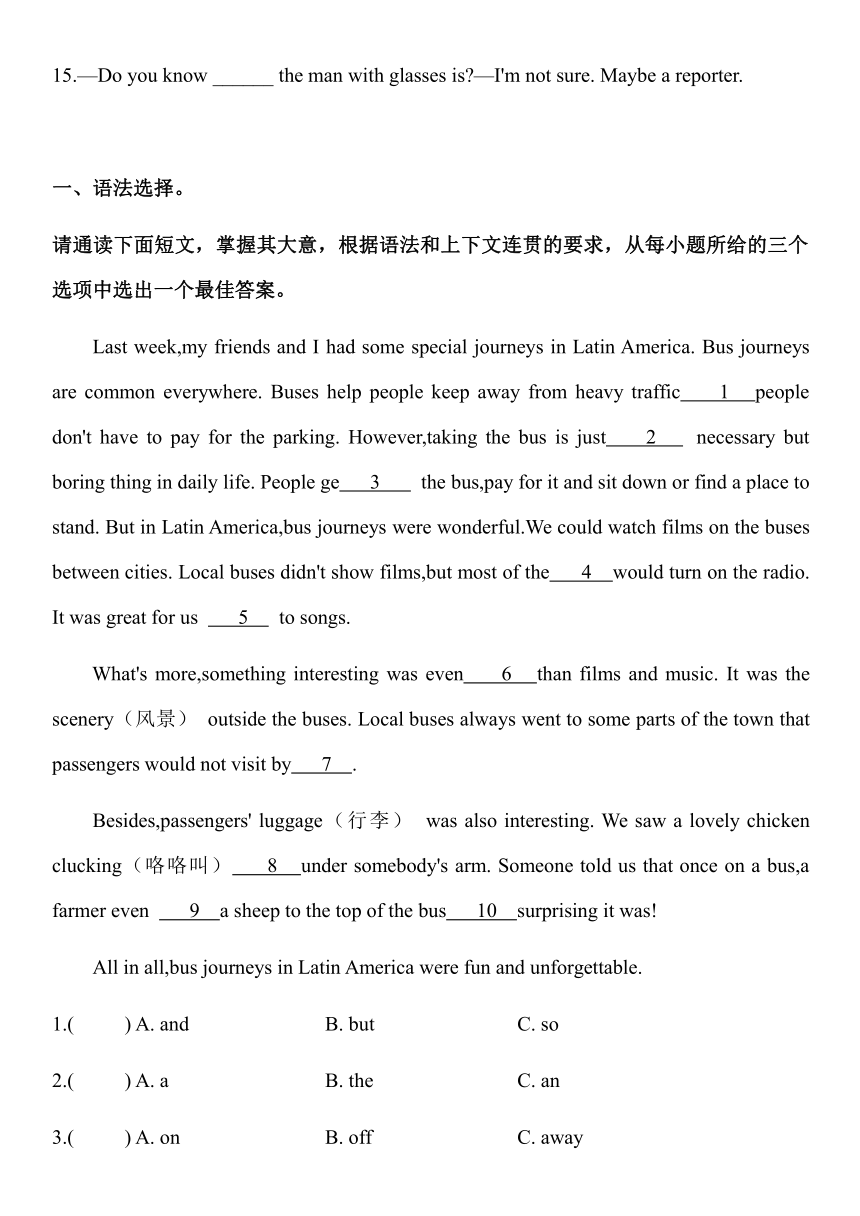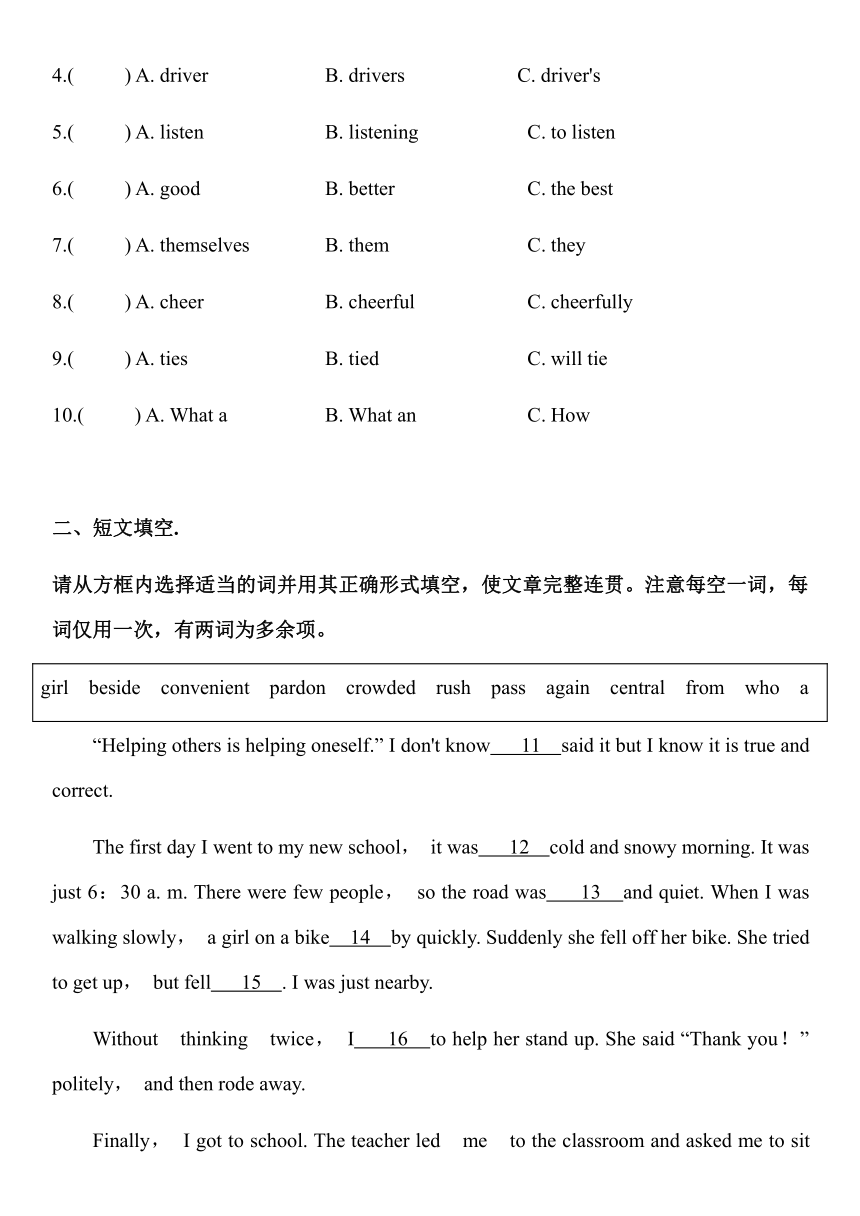Unit 3 Could you please tell me where the restrooms are?知识点讲解及练习(含答案)人教版九年级全册
文档属性
| 名称 | Unit 3 Could you please tell me where the restrooms are?知识点讲解及练习(含答案)人教版九年级全册 |

|
|
| 格式 | docx | ||
| 文件大小 | 412.6KB | ||
| 资源类型 | 教案 | ||
| 版本资源 | 人教新目标(Go for it)版 | ||
| 科目 | 英语 | ||
| 更新时间 | 2024-12-22 00:00:00 | ||
图片预览




文档简介
Unit 3 Could you please tell me where the restrooms are?
一、宾语从句的用法
二、感叹句的用法
语法精炼
Ⅰ.用that,if,whether或所给词的适当形式填空。
1.Wang Hong said _____ she was cooking at 6:00 yesterday morning.
2.I wonder ___/________ I can get some advice from you.
3.I don't know ________ or not they will come for our help.
4.Our geography teacher said _____ the earth _____(go) around the sun.
5.His mother is worried about ________ he lost his job.
Ⅱ.用how,what或what a(n)填空。
6._________ interesting book you are reading!
7.______ good advice you gave me!
8.______ heavily it is raining outside!
9.______ delicious the food you made is!
10.______ hard work it is!I'm afraid you need a long time to finish it.
Ⅲ.用适当的连接词填空。
11.—Do you know ______ Mr. Black will come back
—Maybe next Monday. I'm not sure.
12.—I wonder _____ Anna refused to come to my party.
—Er,her parents didn't allow her to go out on school nights.
13.—I don't know _____ I can improve my spoken English.
—You can try to speak as much as possible.
14.He never told us _____ he lived with.
15.—Do you know ______ the man with glasses is —I'm not sure. Maybe a reporter.
一、语法选择。
请通读下面短文,掌握其大意,根据语法和上下文连贯的要求,从每小题所给的三个选项中选出一个最佳答案。
Last week,my friends and I had some special journeys in Latin America. Bus journeys are common everywhere. Buses help people keep away from heavy traffic 1 people don't have to pay for the parking. However,taking the bus is just 2 necessary but boring thing in daily life. People ge 3 the bus,pay for it and sit down or find a place to stand. But in Latin America,bus journeys were wonderful.We could watch films on the buses between cities. Local buses didn't show films,but most of the 4 would turn on the radio. It was great for us 5 to songs.
What's more,something interesting was even 6 than films and music. It was the scenery(风景) outside the buses. Local buses always went to some parts of the town that passengers would not visit by 7 .
Besides,passengers' luggage(行李) was also interesting. We saw a lovely chicken clucking(咯咯叫) 8 under somebody's arm. Someone told us that once on a bus,a farmer even 9 a sheep to the top of the bus 10 surprising it was!
All in all,bus journeys in Latin America were fun and unforgettable.
1.( ) A. and B. but C. so
2.( ) A. a B. the C. an
3.( ) A. on B. off C. away
4.( ) A. driver B. drivers C. driver's
5.( ) A. listen B. listening C. to listen
6.( ) A. good B. better C. the best
7.( ) A. themselves B. them C. they
8.( ) A. cheer B. cheerful C. cheerfully
9.( ) A. ties B. tied C. will tie
10.( ) A. What a B. What an C. How
二、短文填空.
请从方框内选择适当的词并用其正确形式填空,使文章完整连贯。注意每空一词,每词仅用一次,有两词为多余项。
girl beside convenient pardon crowded rush pass again central from who a
“Helping others is helping oneself.” I don't know 11 said it but I know it is true and correct.
The first day I went to my new school, it was 12 cold and snowy morning. It was just 6:30 a. m. There were few people, so the road was 13 and quiet. When I was walking slowly, a girl on a bike 14 by quickly. Suddenly she fell off her bike. She tried to get up, but fell 15 . I was just nearby.
Without thinking twice, I 16 to help her stand up. She said “Thank you!” politely, and then rode away.
Finally, I got to school. The teacher led me to the classroom and asked me to sit 17 a girl. I was so nervous that I couldn't raise my head. Soon the first class started. It was an elementary (初级的) English course. Their textbook was different 18 mine at my old school. I knew I should make a request for help. Before I said “ 19 me, could I share the …?”, a textbook had appeared in front of me. “Let's share it,” the 20 next to me said. “Hi, I'm Clare.” I looked up. To my surprise, it was the girl that I helped in the morning.
11. 12. 13. 14. 15.
16. 17. 18. 19. 20.
三、阅读理解。
A
Knowing how to ask for directions in foreign countries can make our trips much easier! Here are some suggestions for you.
Using Greetings (问候) and Polite Expressions
Starting the conversation with polite greetings is the most important. If you want to get a great answer, begin by saying “hello” first. Examples: Hello! May I ask you for some help? I need to get to the CN Tower.
Build Your Vocabulary
You should know the basic vocabulary that can be used in asking for directions. Try to remember places like High Park, Queen Street and words like bank, block, etc. Examples: It's about two blocks away from here. Go along the street until you reach the traffic lights.
Learn the Most Commonly Used Prepositions and Adverbs
Remember some important prepositions like “between” and “next to”. And the adverbs like “near” “nearer” and “nearest” are very useful when you need to find somewhere quickly. Examples: The zoo is straight ahead. It's between a bank and a post office.
Try to Know Some Important Landmarks (地标)
Every city in the world has its own landmarks. You can save time if you know where the important landmarks are. Examples: It is next to the CN Tower! Go past the aquarium (水族馆) and then turn left.
( )21. What is the most important when you start a conversation?
A. Building a large vocabulary. B. Asking the right person.
C. Making others understand. D. Greeting the person politely.
( )22. Why is the word “nearest” useful?
Because it can help you make polite expressions.
B. Because it can help you find the place quickly.
Because it can help you find better places.
D. Because it can help you learn about more places.
( )23. How can you save your search time?
A. By using greetings. B. By using polite expressions.
C. By knowing the landmarks. D. By building your vocabulary.
( )24. How many suggestions on how to ask for directions in foreign countries are there in the passage?
A. Three. B. Four. C. Five. D. Six.
( )25. Where is this passage most probably from?
A travel guidebook. B. A science report.
A fashion magazine. D. A book review.
答案:
Ⅰ、1.that 2.if/whether 3.whether 4.that,goes 5.whether
Ⅱ、6.What an 7.What 8.How 9.How 10.What
Ⅲ、11.when 12.why 13.how 14.who/whom 15.what
一、1-5 AAABC 6-10 BACBC
二、11.who 12.a 13.uncrowded 14.passed 15.again
16.rushed 17.beside 18.from 19.Pardon 20.girl
三、21-25 DBCBA
一、宾语从句的用法
二、感叹句的用法
语法精炼
Ⅰ.用that,if,whether或所给词的适当形式填空。
1.Wang Hong said _____ she was cooking at 6:00 yesterday morning.
2.I wonder ___/________ I can get some advice from you.
3.I don't know ________ or not they will come for our help.
4.Our geography teacher said _____ the earth _____(go) around the sun.
5.His mother is worried about ________ he lost his job.
Ⅱ.用how,what或what a(n)填空。
6._________ interesting book you are reading!
7.______ good advice you gave me!
8.______ heavily it is raining outside!
9.______ delicious the food you made is!
10.______ hard work it is!I'm afraid you need a long time to finish it.
Ⅲ.用适当的连接词填空。
11.—Do you know ______ Mr. Black will come back
—Maybe next Monday. I'm not sure.
12.—I wonder _____ Anna refused to come to my party.
—Er,her parents didn't allow her to go out on school nights.
13.—I don't know _____ I can improve my spoken English.
—You can try to speak as much as possible.
14.He never told us _____ he lived with.
15.—Do you know ______ the man with glasses is —I'm not sure. Maybe a reporter.
一、语法选择。
请通读下面短文,掌握其大意,根据语法和上下文连贯的要求,从每小题所给的三个选项中选出一个最佳答案。
Last week,my friends and I had some special journeys in Latin America. Bus journeys are common everywhere. Buses help people keep away from heavy traffic 1 people don't have to pay for the parking. However,taking the bus is just 2 necessary but boring thing in daily life. People ge 3 the bus,pay for it and sit down or find a place to stand. But in Latin America,bus journeys were wonderful.We could watch films on the buses between cities. Local buses didn't show films,but most of the 4 would turn on the radio. It was great for us 5 to songs.
What's more,something interesting was even 6 than films and music. It was the scenery(风景) outside the buses. Local buses always went to some parts of the town that passengers would not visit by 7 .
Besides,passengers' luggage(行李) was also interesting. We saw a lovely chicken clucking(咯咯叫) 8 under somebody's arm. Someone told us that once on a bus,a farmer even 9 a sheep to the top of the bus 10 surprising it was!
All in all,bus journeys in Latin America were fun and unforgettable.
1.( ) A. and B. but C. so
2.( ) A. a B. the C. an
3.( ) A. on B. off C. away
4.( ) A. driver B. drivers C. driver's
5.( ) A. listen B. listening C. to listen
6.( ) A. good B. better C. the best
7.( ) A. themselves B. them C. they
8.( ) A. cheer B. cheerful C. cheerfully
9.( ) A. ties B. tied C. will tie
10.( ) A. What a B. What an C. How
二、短文填空.
请从方框内选择适当的词并用其正确形式填空,使文章完整连贯。注意每空一词,每词仅用一次,有两词为多余项。
girl beside convenient pardon crowded rush pass again central from who a
“Helping others is helping oneself.” I don't know 11 said it but I know it is true and correct.
The first day I went to my new school, it was 12 cold and snowy morning. It was just 6:30 a. m. There were few people, so the road was 13 and quiet. When I was walking slowly, a girl on a bike 14 by quickly. Suddenly she fell off her bike. She tried to get up, but fell 15 . I was just nearby.
Without thinking twice, I 16 to help her stand up. She said “Thank you!” politely, and then rode away.
Finally, I got to school. The teacher led me to the classroom and asked me to sit 17 a girl. I was so nervous that I couldn't raise my head. Soon the first class started. It was an elementary (初级的) English course. Their textbook was different 18 mine at my old school. I knew I should make a request for help. Before I said “ 19 me, could I share the …?”, a textbook had appeared in front of me. “Let's share it,” the 20 next to me said. “Hi, I'm Clare.” I looked up. To my surprise, it was the girl that I helped in the morning.
11. 12. 13. 14. 15.
16. 17. 18. 19. 20.
三、阅读理解。
A
Knowing how to ask for directions in foreign countries can make our trips much easier! Here are some suggestions for you.
Using Greetings (问候) and Polite Expressions
Starting the conversation with polite greetings is the most important. If you want to get a great answer, begin by saying “hello” first. Examples: Hello! May I ask you for some help? I need to get to the CN Tower.
Build Your Vocabulary
You should know the basic vocabulary that can be used in asking for directions. Try to remember places like High Park, Queen Street and words like bank, block, etc. Examples: It's about two blocks away from here. Go along the street until you reach the traffic lights.
Learn the Most Commonly Used Prepositions and Adverbs
Remember some important prepositions like “between” and “next to”. And the adverbs like “near” “nearer” and “nearest” are very useful when you need to find somewhere quickly. Examples: The zoo is straight ahead. It's between a bank and a post office.
Try to Know Some Important Landmarks (地标)
Every city in the world has its own landmarks. You can save time if you know where the important landmarks are. Examples: It is next to the CN Tower! Go past the aquarium (水族馆) and then turn left.
( )21. What is the most important when you start a conversation?
A. Building a large vocabulary. B. Asking the right person.
C. Making others understand. D. Greeting the person politely.
( )22. Why is the word “nearest” useful?
Because it can help you make polite expressions.
B. Because it can help you find the place quickly.
Because it can help you find better places.
D. Because it can help you learn about more places.
( )23. How can you save your search time?
A. By using greetings. B. By using polite expressions.
C. By knowing the landmarks. D. By building your vocabulary.
( )24. How many suggestions on how to ask for directions in foreign countries are there in the passage?
A. Three. B. Four. C. Five. D. Six.
( )25. Where is this passage most probably from?
A travel guidebook. B. A science report.
A fashion magazine. D. A book review.
答案:
Ⅰ、1.that 2.if/whether 3.whether 4.that,goes 5.whether
Ⅱ、6.What an 7.What 8.How 9.How 10.What
Ⅲ、11.when 12.why 13.how 14.who/whom 15.what
一、1-5 AAABC 6-10 BACBC
二、11.who 12.a 13.uncrowded 14.passed 15.again
16.rushed 17.beside 18.from 19.Pardon 20.girl
三、21-25 DBCBA
同课章节目录
- Unit 1 How can we become good learners.
- Section A
- Section B
- Unit 2 I think that mooncakes are delicious!
- Section A
- Section B
- Unit 3 Could you please tell me where the restroom
- Section A
- Section B
- Unit 4 I used to be afraid of the dark.
- Section A
- Section B
- Unit 5 What are the shirts made of?
- Section A
- Section B
- Review of Units 1-5
- Unit 6 When was it invented?
- Section A
- Section B
- Unit 7 Teenagers should be allowed to choose their
- Section A
- Section B
- Unit 8 It must belong to Carla.
- Section A
- Section B
- Unit 9 I like music that I can dance to.
- Section A
- Section B
- Unit 10 You're supposed to shake hands.
- Section A
- Section B
- Review of Units 6-10
- Unit 11 Sad movies make me cry.
- Section A
- Section B
- Unit 12 Life is full of the unexpected
- Section A
- Section B
- Unit 13 We're trying to save the earth!
- Section A
- Section B
- Unit 14 I remember meeting all of you in Grade 7.
- Section A
- Section B
- Review of Units 11-14
